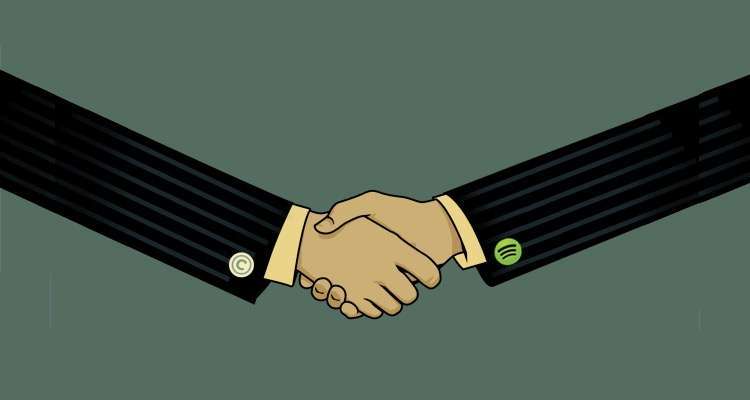
Spotify and a number of major US-based music publishers are now preparing an out-of-court settlement over unpaid publishing royalties, according to confidential details shared with Digital Music News this morning.
The settlement, expected to be announced as soon as this week, will revolve around mechanical licenses, a specific type of music copyright at the center of an onslaught of lawsuits. Collectively, those lawsuits could reach damages in the hundreds of millions of dollars, with Spotify already slapped with multiple class actions with estimated damages of roughly $200 million.
Other on-demand services like Microsoft’s Xbox Music and Groove Music have already reached early, out-of-court agreements, suggesting strong, ‘slam dunk’ cases by publishing plaintiffs.
Against that extremely expensive backdrop, urgent settlement agreement negotiations have been happening, according to a pair of sources to Digital Music News. A chief negotiator for the settlement appears to be the National Music Publishers’ Association, or NMPA, a DC-based industry group that represents the interests of a long list of publishers and songwriters. That list includes many of the largest publishing interests in the United States, many of whom may be interested in reaching a quick agreement without expending massive litigation resources.
National Music Publishers’ Association CEO David Israelite confirmed the settlement discussions with Digital Music News on Monday, while agreeing to offer more details at a later point. “NMPA has been engaged in negotiations over the failure by several digital music services to license and pay songwriters and music publishers appropriately,” Israelite confirmed to DMN via email. “I am hopeful that we can reach a just settlement that provides a framework for moving forward as business partners – as it should be.”
Spotify has also been contacted for more information, specifically via its PR agency Outcast Agency, but has not yet responded. Ahead of more details from either party, here are the details on the agreement according to DMN sources:
(a) The settlement will call for Spotify to create a dedicated matching interface for publishers and songwriters to properly pair their recordings with their publishing rights. This has been a major complaint by Spotify, which has argued that songs are not being supplied with accurate data on who owns what, and who should be paid.
(b) After those matches are made and verified (via Spotify and/or the NMPA), unreleased and unpaid mechanical licensing money will be remitted. These unpaid royalties will be cumulative to the first unpaid stream (potentially dating back to 2007-8).
(c) Updated rights information will then be shared with the Harry Fox Agency, or HFA, which administers mechanical licensing for Spotify. That updated information will in turn be shared with other HFA partners, specifically other on-demand streaming services, to facilitate the proper payout of previous mechanical royalties.
(d) After a certain period, unclaimed mechanical publishing royalties will be paid to the NMPA, and divided among NMPA members based on total market share. According to that plan, smaller songwriters and publishers would miss payments entirely if not apprised of the plan.
(e) At this stage, it remains unclear if this updated rights data will be shared with other agencies that handle mechanical rights licensing, including Music Reports, Inc., or YouTube-owned Rightsflow.
(f) As part of the settlement, Spotify will be assessed a one-time penalty, understood to be in the order of $5 million. That, coupled with participation in the settlement, will absolve Spotify of any future liability litigation, at least among participating publishers and songwriters (and possibly, all NMPA members).
A key negotiator on the deal within the NMPA appears to be General Counsel & SVP of Business Affairs Danielle Aguirre, copied on initial correspondence between Digital Music News and Israelite (bio here). It is unclear who the specific negotiators for Spotify or other streaming services might be.
In terms of participation, major publishers Universal Music Publishing Group and Sony/ATV appear to have signed onto the pact, with mega-publisher Warner/Chappell still a holdout.
At this stage, we have no other information on settlement participants, though a large group of litigants in the recently-filed Spotify class action are specifically non-NMPA and non-HFA members.
In terms of when the deal with be announced, sources only indicated that the parties are ‘working very rapidly’ to finalize terms and move forward with the agreement. Adding extreme urgency to the matter are a growing pile of lawsuits, with aggressive plaintiffs like David Lowery, Yesh Music, and others expanding the list of defendants and aggressively adding members to the class action.
The settlement could offer a serious blow to those lawsuits and specifically class actions against Spotify and other streaming services. According to sources, the settlement would effectively ‘reduce the addressable class‘, i.e., lower the number of potential participants, while also presenting a viable settlement solution to judges hearing the complaints.
Already, reactions to the upcoming settlement have been mixed. The $5 million, one-time penalty against Spotify, if confirmed, has been blasted as a ‘slap on the wrist,’ while letting the company off the hook for failing to properly license works prior to making them available. On top of that, the on-site matching interface has been criticized as ‘free homework’ for diligence Spotify should have already completed, while bolstering out-of-date information at HFA (itself formerly owned by NMPA). “The NMPA has been accused of not getting this job done,” one frustrated source relayed.
“Now, they’re making money from their own inability to get the job done.”
Others continue to point a damning finger at the Harry Fox Agency, an organization that has been blamed for failing to maintain accurate databases and properly alert its customers (i.e., streaming services) of the coming tsunami. HFA is currently owned by SESAC and private equity interests. [DigitalMusicNews]

